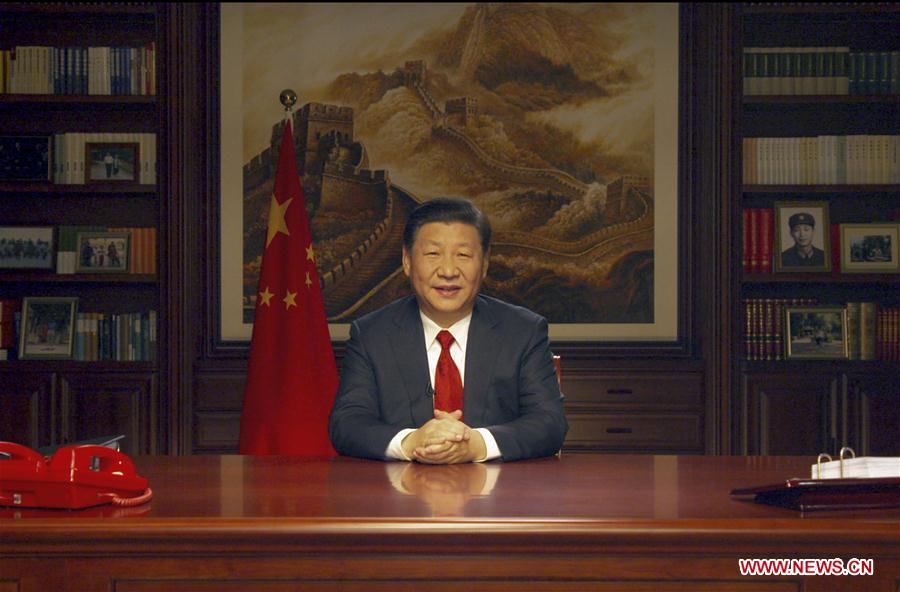
In his speech on New Year's Day, Chinese President Xi Jinping declared: "We should seize the 40th anniversary of 'reform and opening' as a critical moment (qiji) to continue our reforms and bring them to complete fruition."
While listeners may be quick to dismiss his statement as vacuous pomp, Mr Xi actually means what he says. 2018 is a "critical moment." In December 1978, the reformist leadership under Deng Xiaoping made a historic decision to open markets and experiment with capitalist reforms.
Forty years later, China achieved a turnaround from over a century of poverty and decline, ascending into middle-income status. Importantly for the rest of the world, this economic rise happens to coincide with the United States' apparent retreat from global leadership, which has opened the way for China to fill the gap.
Given this critical moment, the review of history in the past 40 years will take on extraordinary significance. Indeed, Mr Xi has been urging his compatriots to "tell China's story well."
Storytelling is serious business for the Chinese Communist Party (CCP), just as "framing" is pivotal to American politics. How the party tells the story of China's transition from a planned to market economy will shape future policy steps, both at home and abroad.
On the domestic front, two key issues will stand out. Did development succeed primarily because of state intervention or free markets? Was centralization or decentralization the key to China's success? The story can be told in completely different ways.
One version of the tale could be that free markets were the reason for China's prosperity.
Another version, however, could be that market activities thrived only under the watchful eye and command of the state. There is evidence for either narrative, depending on which period and part of China the party chooses to look at.
During the Third Plenum in 2013, Mr Xi appeared ambivalent on economic policies, pronouncing that markets should play a "decisive" role in resource allocation, yet stressing that the state should continue to take a "lead role" in the economy.
The party's narrative for the 40th anniversary, which top party cadres are already busy debating and crafting, will signal Mr Xi's future domestic reforms, in particular whether he will follow through his promises of structural overhaul and let markets lead.
On the international stage, storytelling takes on even greater significance. In the past years, China's global role has been largely centered on exporting capital and infrastructure overseas, particularly through the grandiose Belt and Road Initiative.
Increasingly, however, Mr Xi's administration realizes that, apart from disbursing funds, China ought to also contribute to shaping ideas in global development. After all, this is the single most successful case of poverty reduction in the world. The trillion-dollar question is: what lessons can China's experiences offer to other developing countries?
This question is actually being debated within China; indeed, within the highest echelons of power. At the 19th Party Congress in October last year, Mr Xi underscored the value of "Chinese wisdom and a Chinese approach to solving the problems facing mankind."
Yet, he does not specify what the Chinese "wisdom" or "approach" consists of. The leadership is not deliberately being coy or cryptic. To begin with, China's process of development is so complex and fast-changing that it is difficult for anyone - even top policymakers - to pinpoint the Chinese approach. Moreover, while the U.S. can proudly claim democracy and freedom as its foundation, China obviously cannot do the same. It lacks an acceptable substitute for American-style democratic values.
Consequently, China has tried to use trite phrases like "common prosperity" (Belt and Road Initiative) and "innovative, invigorated, interconnected and inclusive world economy" (G-20 Summit in Hangzhou) as bumper stickers. But these ring hollow, especially to Western observers, because they ignore an obvious fact: single-party rule.
In the remaining months of this year, one great challenge facing the CCP will be to tell China's story well. This will require confronting the role of politics - and especially of the party - in development, articulating a political system that is distinct from American-style democracy and yet has aided market reforms, and drawing generalizable lessons from China's past experiences for other developing countries. For any storyteller and policymaker, this is a gargantuan task, but one that must be delivered before December.
Such a story, if told well, will not only enhance China's profile abroad but also shape its global development policies and domestic reforms in years to come.
This article was first published in Straits Times.
